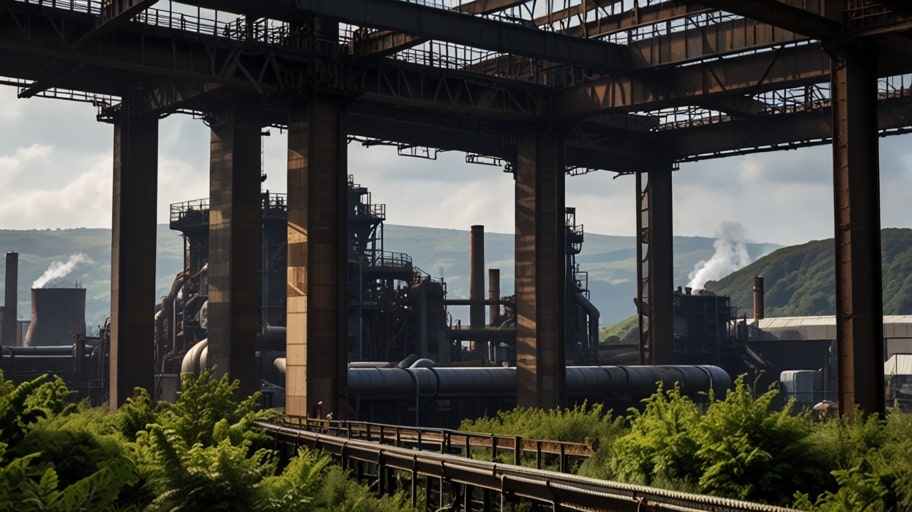
Tata Steel’s Green Revolution in UK Industry
The company will start the low-carbon project at Port Talbot in July 2025. It will cost £1.5 billion and revolutionize UK operations. The goal is to switch from blast furnaces to electric arc furnaces, leading to a big decrease in carbon emissions.
A New Era for Port Talbot
The main UK steel-making facility at Port Talbot will undergo a major overhaul. Tata Steel aims to start construction in July 2025, and operations should start by 2027. The decision aligns with global sustainability practices and the UK’s environmental goals.
Government Backing Fuels Progress
The Tata Steel project in the UK is getting £500 million from the UK government. The increase in funding demonstrates how vital this project is for the nation’s economy and how it helps with green technology. Collaboration testifies to a similar commitment between the companies to preserve the environment.
Shifting to Electric Arc Furnaces
Using electric arc furnaces will allow Tata Steel to rely less on processes that release a lot of carbon. This change will greatly reduce emissions and make Tata Steel a top eco-friendly steel producer in the UK.
Economic Impacts and Job Creation
The project intends to save employment at Port Talbot and also create opportunities for green technology work. Tata Steel’s desire to upgrade its operations is intended to promote the local economy and ensure the safety of steel industry workers in the long run.
Navigating Global Trade Challenges
Disputes in global trade, mainly with China, have caused problems for the UK steel sector. If Tata Steel focuses on producing fewer carbon emissions, it could avoid problems tied to tariffs and climb to the top while preserving the environment.
Technological Innovation at the Core
The use of electric arc furnaces shows major technological progress. Thanks to this approach, Tata Steel produces steel in a greener way, attracting people who care about the environment.
Sustainability as a Market Advantage
Tata Steel is in a good position because more consumers and businesses focus on sustainability. The company’s efforts to reduce carbon emissions may encourage more clients and investors and increase its influence in the UK and elsewhere.
Overcoming Operational Challenges
Part of the company’s operations have suffered from short-term closures in the UK. Customers are being served continuously because operations are ongoing from the company’s places of work in India and the Netherlands. The project in Port Talbot demonstrates Tata’s strong comeback to operating in the UK.
A Model for Industry-Wide Change
Tata Steel’s action might lead to changes in other fields in the UK. Bringing general dogmas to the subject, as companies struggle to become more sustainable, Tata’s actions prove how important innovation and government backing are for sustainable growth and may affect overall rules and policies in the industry.
Community and Environmental Benefits
The project is believed to limit air pollution in Port Talbot and enhance the lives of its residents. By giving top priority to environmental protection, the company builds good relationships with local communities and acts responsibly in the community.
Global Context and Competitive Edge
Since the global steel market is under pressure, Tata Steel stands out because of its focus on sustainability. This allows the company to expand into markets by stressing ecological products and strengthening its global image by working toward worldwide climate targets.
Financial Implications and Growth
Tata Steel’s £1.5 billion investment shows that the company is certain about the UK market. The project, which is set to be finished in 2027, should increase revenue and profit, demonstrating how the company may prosper in the future.
Collaboration with Local Stakeholders
The company collaborates with the local government and unions to make the process of closing the plant smooth. Working together in this way prevents major obstacles and helps the project fulfill the specific needs of the community for the future.
Challenges of Transitioning Operations
Introducing new electric arc furnaces means dealing with complicated complexities and difficulties. While handling these responsibilities, Tata Steel must ensure it produces high-quality products. The company’s knowledge of running operations worldwide will play a key role in navigating this transformation.
Future-Proofing the UK Steel Industry
The UK steel sector could benefit greatly from Tata Steel’s increased investments. When the company uses the latest technology, it becomes strong enough to face any economic or environmental changes, and others can use its example as a guideline.
A Vision for Long-Term Sustainability
Work on the Port Talbot project is helping Tata Steel work toward net-zero emissions. By committing for such a long time, the company proves that it focuses on sustainable growth and supports global actions fighting climate change and encouraging eco-friendly industry activities.
Market Response and Investor Confidence
People who invest in Tata Steel are supportive of the green measures, as they think it will provide long-term rewards. Because the project follows ESG (Environmental, Social, Governance) rules, it draws attention from sustainable funds and increases investors’ confidence.
A Catalyst for Policy Reform
Tata Steel’s approach might affect the making of environmental and industrial guidelines in the UK. If demonstrated, the company’s achievements at scale might give lawmakers more incentives for companies to adopt green practices.
Conclusion: A Bright Future for Tata Steel
Tata Steel’s £1.5 billion investment represents a big change for the UK’s steel sector. Prioritizing sustainable practices, new ideas, and caring for the community allows the company to succeed and sets an example that protects the environment.



 Bitcoin
Bitcoin  Ethereum
Ethereum  Tether
Tether  XRP
XRP  USDC
USDC  Solana
Solana  TRON
TRON  Lido Staked Ether
Lido Staked Ether  Cardano
Cardano  Avalanche
Avalanche  Toncoin
Toncoin